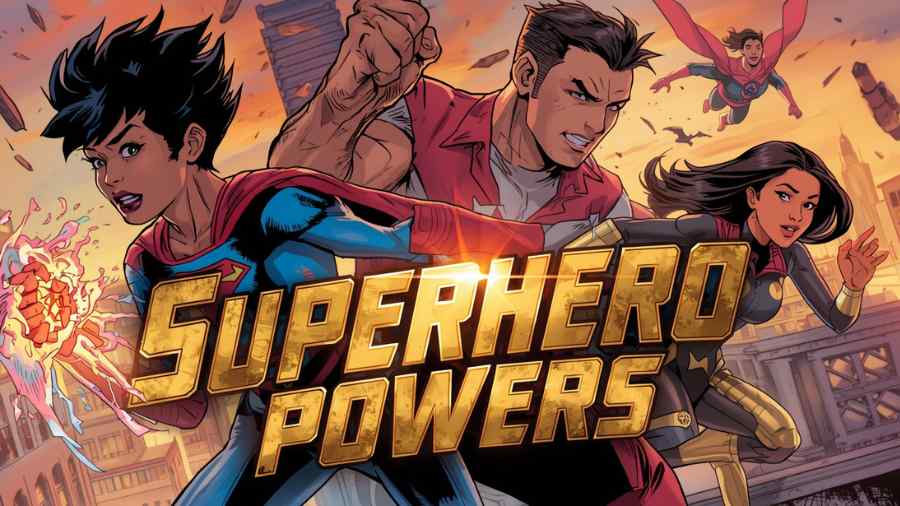Superhero Powers: Exploring the Extraordinary Abilities That Define Heroes

Superhero powers have captured the imagination of audiences for decades, serving as the defining traits that separate ordinary individuals from extraordinary heroes. From comic books to blockbuster movies and video games, these abilities shape not only the stories but also the identities of the characters who wield them. Understanding superhero powers means diving into a rich world of creativity, science fiction, and human aspiration.
Defining Superhero Powers
At their core, superhero powers are abilities that transcend normal human limitations. They can be innate, gained through accidents, experiments, or technological enhancements, and often reflect the character’s personality, moral code, or origin story. Powers range from physical enhancements like super strength or speed to mental capabilities such as telepathy and mind control. They can also extend to elemental manipulation, reality-altering abilities, or even the use of advanced technology to mimic superhuman skills.
These powers are not just tools for battle—they define the hero’s role, influence their relationships, and drive the narrative of the stories they inhabit. A hero’s power often symbolizes deeper themes, such as responsibility, resilience, and justice, making them relatable despite their extraordinary nature.
Categories of Superhero Powers
Superhero powers are often grouped into categories to better understand their scope and impact. Some of the most common include:
- Physical Enhancements: Super strength, speed, agility, and endurance fall under this category. Characters like Superman, Wonder Woman, and The Flash exemplify how amplified physical abilities allow heroes to perform feats impossible for ordinary humans. These powers often create dramatic and visually striking action sequences, serving as a symbol of heroism and resilience.
- Elemental Powers: Control over elements like fire, water, air, and earth adds versatility and spectacle. Characters like Storm from the X-Men or Avatar Aang harness these powers to manipulate their surroundings and gain tactical advantages. Elemental powers often have thematic ties to a character’s personality or origin, enhancing the storytelling depth.
- Mental and Psychic Abilities: Telepathy, telekinesis, and precognition provide heroes with strategic advantages, enabling them to anticipate danger, manipulate objects, or communicate silently. Professor X and Jean Grey are iconic examples, showcasing how intelligence and psychic skill can be as powerful as brute strength.
- Technological and Gadget-Based Powers: Some superheroes rely on inventions and gear to perform extraordinary feats. Batman’s arsenal or Iron Man’s powered suits demonstrate how ingenuity and technology can simulate superhuman capabilities, emphasizing the human potential for creativity and adaptation.
- Reality-Altering and Cosmic Abilities: At the extreme end, some heroes wield powers that can bend time, manipulate matter, or alter reality itself. Characters such as Doctor Strange or Scarlet Witch represent the ultimate fantasy of limitless potential, but their abilities often come with high stakes and ethical dilemmas, reinforcing narrative tension.
The Importance of Limitations
Superhero powers are most compelling when balanced by limitations. Without boundaries, characters risk becoming invincible and unrelatable. Limitations might include energy depletion, vulnerability to certain substances, or moral and psychological constraints. For instance, Superman’s weakness to kryptonite ensures tension and vulnerability despite his godlike abilities. Limitations not only create suspense but also provide opportunities for character growth, strategy, and emotional storytelling.
Evolution and Mastery of Powers
superhero powers are rarely static. Many characters experience evolution or mastery over their abilities, reflecting their growth and experiences. Spider-Man’s refinement of his wall-crawling and web-slinging skills, or the gradual mastery of magic by Doctor Strange, demonstrates how powers can develop in tandem with personal growth. This evolution also allows for variations in power intensity, application, and scope, keeping narratives fresh and engaging.
Applications Beyond Combat
While superhero powers are often showcased in battle, their applications extend far beyond fighting villains. Healing abilities, teleportation, flight, or super intelligence can serve humanitarian purposes, rescue operations, and problem-solving in creative ways. Superhero powers thus symbolize potential for positive change, highlighting how extraordinary abilities can be used to benefit society rather than solely for personal gain.
Cultural Significance of Superhero Powers
Superhero powers reflect society’s hopes, fears, and ethical questions. They allow audiences to explore moral dilemmas: How should one use extraordinary abilities responsibly? What sacrifices are acceptable to protect others? How do powers shape identity and purpose? These questions resonate globally, making superheroes and their powers enduring symbols of courage, responsibility, and imagination.
Superhero powers also inspire real-world creativity, influencing technological innovations, storytelling, and even personal aspirations. The fantasy of flight or super strength encourages people to imagine a world beyond limitations, nurturing curiosity, creativity, and the desire for self-improvement.
Conclusion
Superhero powers are far more than fantastical traits—they are fundamental elements that define characters, drive narratives, and captivate audiences. By categorizing and exploring these abilities, fans and creators alike gain a deeper understanding of the limitless possibilities within fictional universes. Whether through physical prowess, psychic abilities, elemental control, or technological ingenuity, superhero powers embody the ultimate expression of human imagination.
As long as stories of heroism continue to captivate hearts, superhero powers will remain a central and inspiring part of popular culture, reminding us of the extraordinary potential that lies within us all—even if only in our imagination.



